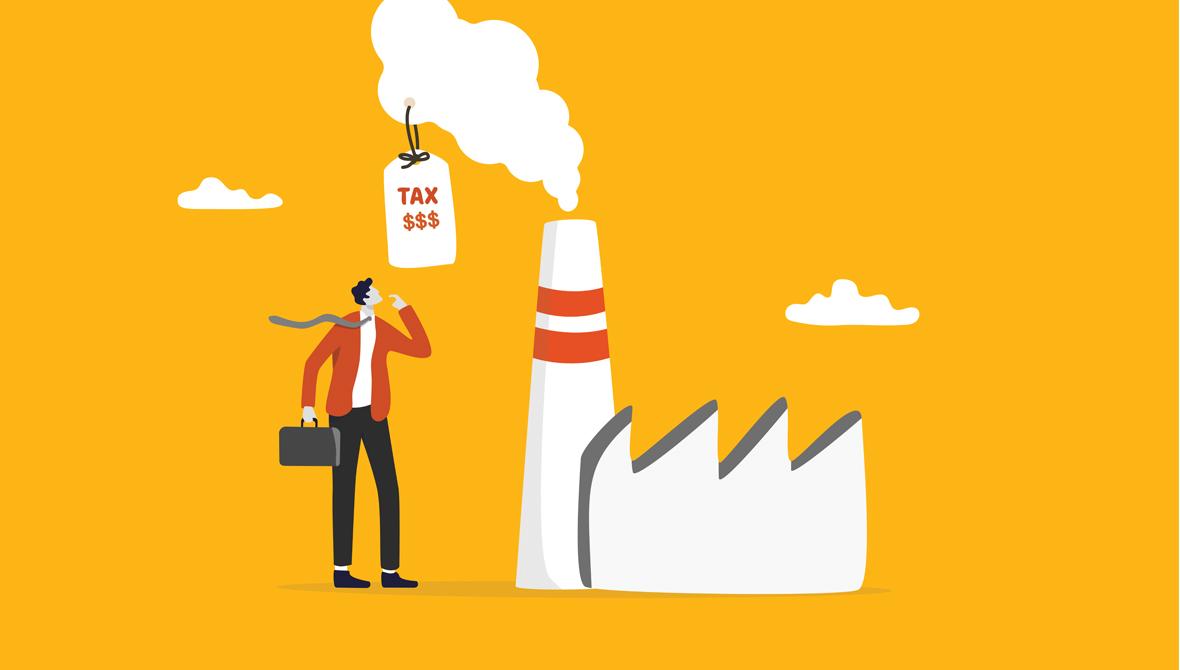Carbon taxes and the green transition
Episode 7 of the Take on Tomorrow podcast features Danae Kyriakopoulou, from the Grantham Research Institute on Climate Change and the Environment, and Ian Milborrow, a sustainability and climate-change partner with PwC UK.

If you want to stop people from using something, tax it more. That’s what many governments have been trying to do with carbon. But carbon pricing is controversial and politically hard to implement: only 30% of the carbon emissions produced in the world are subject to tax. Given the urgency to reduce the use of fossil fuels in order to achieve more aggressive climate goals, should businesses prepare for an expansion in carbon taxation? The answer is complicated.
“There is a tendency to think of carbon pricing as a solution, as a silver bullet, as something that will magically solve climate change from one day to the next,” cautioned Danae Kyriakopoulou, an economist with the Grantham Research Institute on Climate Change and the Environment. In Episode 7 of our Take on Tomorrow podcast series, Kyriakopoulou discussed the limits of the role that carbon pricing can play in the race to net zero: “And I think it’s dangerous to think in that way. It is a very important ingredient that we must have, but it is not the only thing that we must do.”
The global push to encourage people and businesses to reduce the use of fossil fuel will require a mix of sticks and carrots. Ian Milborrow, sustainability and climate change partner with PwC UK, added, “Generally, [that’s how] we try and change the behaviors about the production or consumption of that particular item…to move to a better allocation of resources, and shift that burden of obligation onto the people who are causing the problem.”
The big issue when it comes to carbon taxes is fairness. “We want a green transition,” Kyriakopoulou said. “We want a transition to an economy that is robust, in terms of the risks of climate change. But, also, we want a just and a fair transition. And there are risks that, if implemented in a way that does not prioritize this, such taxes can be regressive.”
We want a transition to an economy that is robust, in terms of the risks of climate change. But, also, we want a just and a fair transition.”
There are, however, various ways to use carbon tax revenues to help. For example, as Kyriakopoulou noted, they can be applied “to subsidize energy-efficiency improvements, so that households reduce their demand for energy in the first place. Or [to] incentivize and subsidize the shift to electric vehicles.”
That’s just a start. At the moment, the world isn’t on a net-zero decarbonization trajectory, so the pace of change needs to quicken. Kyriakopoulou noted, “That’s going to come from the role of governments in how they design carbon taxes, emissions trading regimes, and how those policies will gradually expand to different sectors of the economy.” And, as Milborrow pointed out, “Regulated carbon markets can take a while to design, and they often get fine-tuned by policymakers once they’re up and running.” In the meantime, it behooves investors to allocate capital to businesses that are at the forefront of that decarbonization journey—they could be rewarded in terms of superior returns.
There’s no doubt, Milborrow predicted, that there will be more taxes aimed at reducing carbon. And those taxes will force behavioral change. “The onus is upon us and our children to understand the issue,“ Kyriakopoulou said, “and to try and have choices, both available to us and for us, to take personal accountability for some of our own decisions, such that we can all play our part in getting on that right path.”
To hear the podcast in its entirety, go here.




